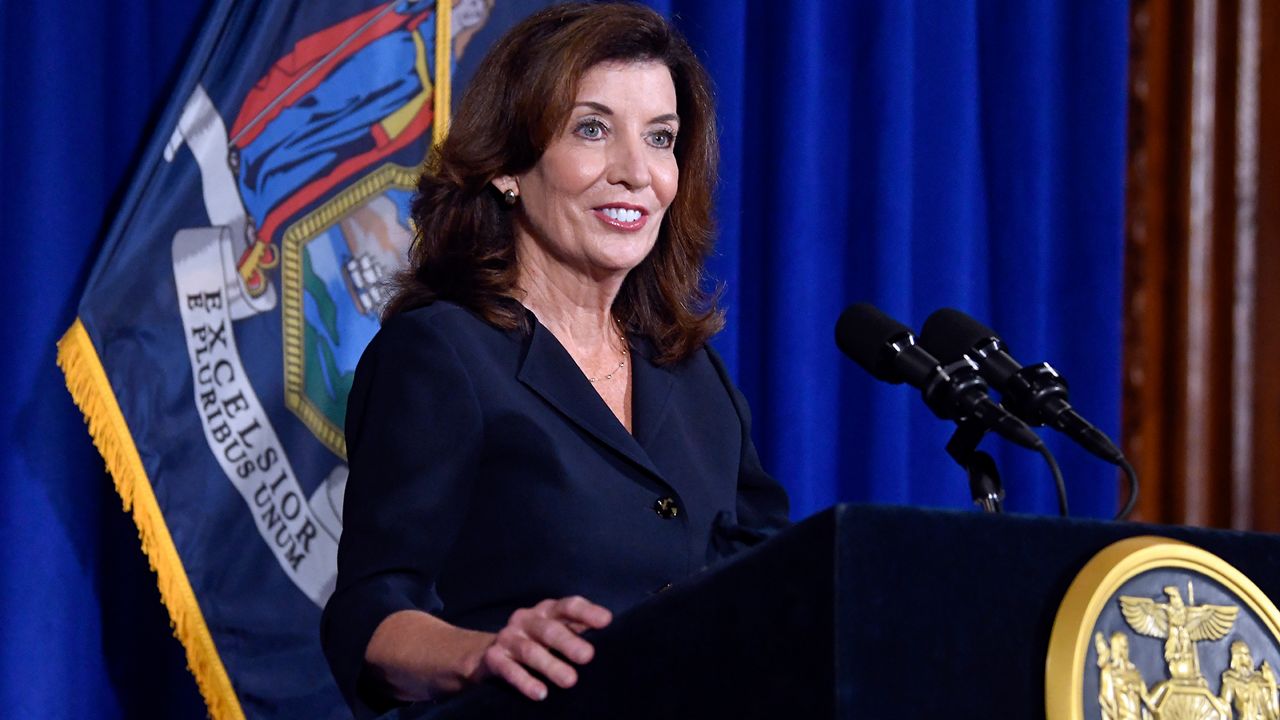In the last week, Gov. Kathy Hochul has had three basic tasks: Introduce herself to the millions of New York voters who don't know a thing about her, make appointments to her embryonic administration and respond to the inherited, multi-directional crisis that is the ongoing pandemic.
Since taking office last Tuesday, Hochul has made some splashy appointments to her administration, including a new lieutenant governor, Harlem state Sen. Brian Benjamin. She's hired Kathryn Garcia, a former New York City mayoral candidate, to become her state operations director.
Her new administration has moved to impose universal indoor mask requirements for schools, and is negotiating with teachers unions for mandating vaccinations. She's appeared around the state, popping up at the Saratoga Racecourse and the State Fair in Syracuse.
And on Wednesday night, the first week culminated with a special session of the state Legislature in which state lawmakers agreed to a package of measures extending the eviction moratorium to January, inserted a provision to allow landlords to challenge hardship cases in court in order to withstand judicial scrutiny and confirmed appointments to a cannabis management program for the state to jumpstart a new industry.
In all, her administration has had the multi-headed challenge of turning the page on scandal, implementing a government transition and working on a legisaltive agenda in the span of just over seven days.
Hochul takes a victory lap later on Thursday in Yonkers and Brooklyn with events highlighting the day's accomplishments.
“Gov. Kathy Hochul and the state Legislature are showing real leadership in extending critical tenant protections while also recognizing the importance of preserving the rights of landlords, who are also struggling as a result of the ongoing challenges posed by the coronavirus pandemic," said T. Andrew Brown, the president of the New York State Bar Association. “The financial impact of the COVID crisis has weighed particularly heavily on small business owners and lower-income residents – particularly essential workers and members of communities of color who were disproportionately impacted by the virus."
Much of what Hochul has had to contend with in the last week are inherited problems. Rent relief money for landlords and tenants who are struggling financially had been sluggish to get out the door.
The cannabis management jobs had been vacant for months, leading to concerns the new industry would take longer to launch in New York given the time to grow marijuana plants and convert them into commercial products. The hope is the new leadership, Tremaine Wright as chairwoman, Christopher Alexander as executive director, can implement the state's Marijuana Regulation and Taxation Act from the spring.
"We hope the new leaders bring urgency to the implementation of much-needed changes to the medical cannabis program that were approved when the MRTA became law five months ago," said the New York Medical Cannabis Industry Association, a trade group.
Hochul has pledged to take a different approach than her predecessor, former Gov. Andrew Cuomo, and the word "collaborative" has been used a lot in the last seven days in Albany.
"We serve New Yorkers best when all branches of government are working together constructively and this special session was an example of local governments working in partnership with the Governor, Majority Leader, Speaker and all state lawmakers to ensure government continues to function safely and efficiently as we fight COVID-19,” said Jack Marren, the president of the New York State Association of Counties.
But there are still challenges that lie ahead that will no longer be inherited problems, but issues the new Hochul administration owns.
Week two of the Hochul administration will contend with the catastrophic flooding overnight from the remnants of Hurricane Ida in the New York City area.
Money from the Emergency Rental Assistance Program must still get into the hands of those who need it in order to stave off eviction proceedings. The negotiations to impose vaccination requirements on education workers remain up in the air and a new school year is beginning.
And the process of getting the work done in Albany, collaborative approach or not, was still first much business-as-usual for some. The details of a finalized legislative package were not released until hours before state lawmakers voted on it. The state's open meetings law is being revised so public bodies in New York can meet in video conference until Jan. 15.
She will continue to face pressure to oust appointees of the former Cuomo administration, including Health Commisssioner Howard Zucker.
“We have heard a lot about how with a new administration there would be a beginning of a new chapter of transparency, but it’s business as usual in Albany," said Republican Assemblyman Josh Jensen. "Deals are still being negotiated in secret by three people in a room with a limited amount of public debate, as they seek to solve a political crisis, rather than an actual crisis."


